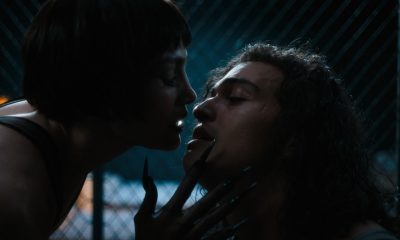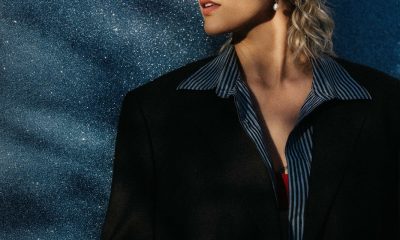Arts & Entertainment
EXCLUSIVE: Broadway’s first Tony-nominated trans actress speaks out
‘It feels like a dream, it feels wonderful, it feels exciting’
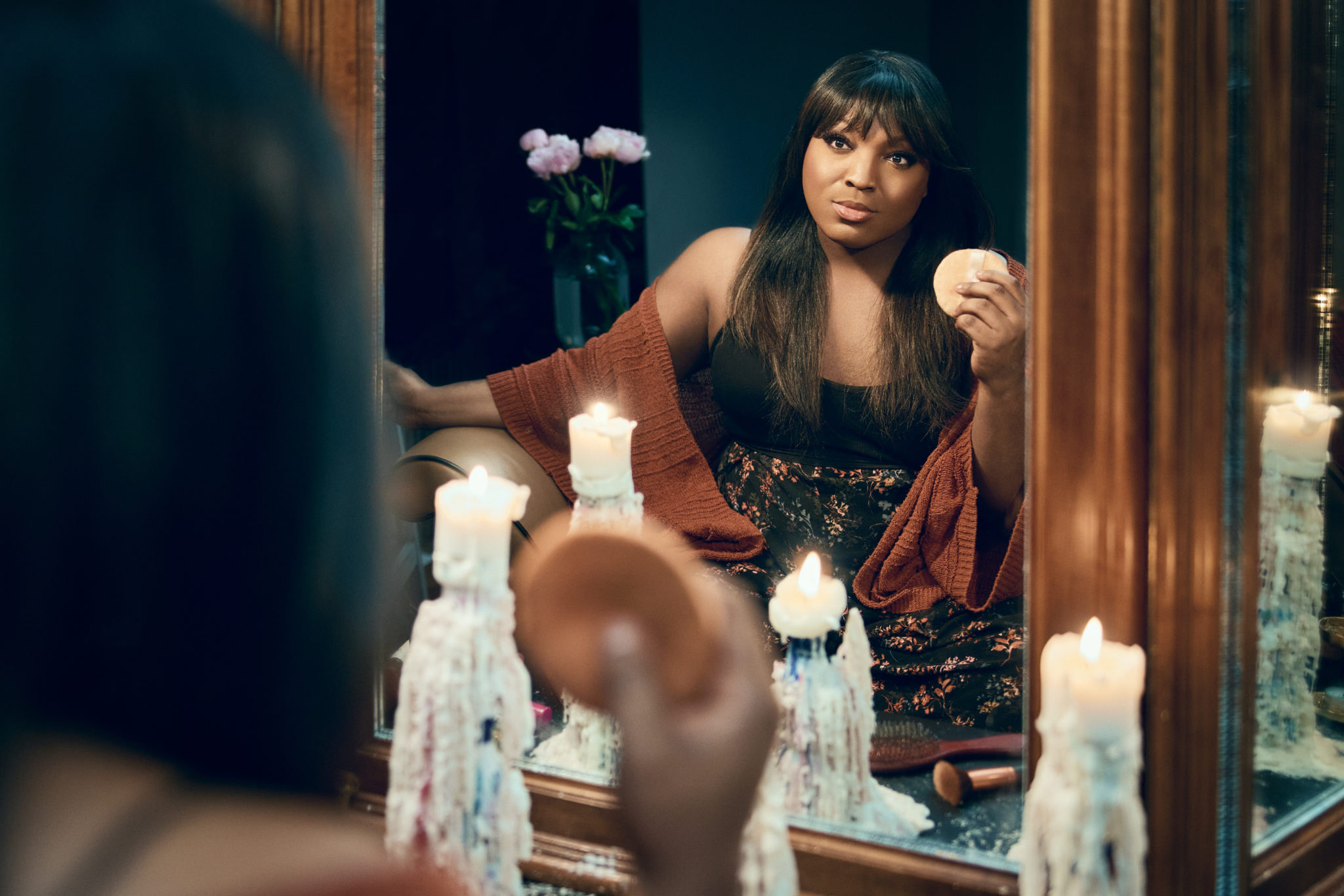
“I am just a girl,” L Morgan Lee tells me. That simple statement is her self-definition, a girl taking life one step at a time.
To the rest of us, L Morgan Lee is so much more. She is the award-winning actress starring on Broadway in the hit show of the season, “A Strange Loop.” Her singing talent matches that of any legendary diva, she is creating landmark theatrical projects on womanhood and New York Times articles are being written about her. She is the “girl” in the spotlight now.
She is also, the first ever transgender actor or actress to receive a Tony Award nomination.
While she is not the first trans performer to be seen on a Broadway stage, she seems to have broken the glass (or some might say, cement) ceiling of being recognized in the upper echelon of talent. She is the first transgender performer to be in a work that has won a Pulitzer. While the Pulitzer recognizes the author, whom she was not, certainly her creative input was weaved into the final book of the play.
L Morgan has journeyed a complex path to self-awareness. “For me, even in terms of being trans, the idea of being anything outside of what I was assigned at birth was just laughable and crazy to me as a child,” she says. “It just, it made no sense. It was not something that I was comfortable saying out loud to anyone or voicing. How would I be looked at by my parents, by anyone else? So, I would sit and dream. The dreaming is, I think, what forms, much of so many queer people’s lives and experiences. Those dreams become our lifelines. I would dream and dream. I have a memory of when I was maybe six years old, in the middle of the night, looking up at my ceiling in my bedroom. Waking up soaked with tears. Saying, if I could wake up and be a girl, a girl, everything would be okay.”
She adds, “That is why I am so excited to have gotten my first opportunity to be on Broadway, excited to have gotten a Tony nomination. Because I know that there is some kid somewhere, who is also looking up at the ceiling saying that same thing.”
L Morgan’s first adventure into performing was as a kid and ironically projected her future identity fluidity: She costumed up and performed “Karma Chameleon” in nursery school. She allowed herself to explore her true identity under the guise of a Halloween costume quite a few years later. She went in fully fashion glam drag, and it changed her world forever. “The minute I did it, I felt a jolt of energy I had never felt before. I finally felt free in so many ways. It’s as if I finally got to breathe.”
When she started work on “A Strange Loop,” she had been cast under the assumption that she was a cisgender man playing female parts. As the years of work into the play went on, L Morgan’s transgender journey escalated, and she attempted to resign from the play as she realized she was no longer the person they thought they had hired. Not only were they aware, as many close loved ones can be, of her journey, but they embraced her and assured her that she belonged more than ever.
“The characters I played allowed me to, in some ways hide until I was able to be more public about who I am. And once I did that, it certainly brought another layer of depth to what I was doing. I have been that much more comfortable in my own skin. I’ve grown. Transition has settled in more. So, both my viewpoints about the show, the people I’m playing, and my lens of life in general, have evolved through the process. So, certainly the woman I am today, views the show and the script, and the characters I play in a very different way than I did when I first sat down to do it in 2015.”
Her growth within the show, and the growth of the show itself are intertwined. Certainly, some of the magic of the show is that it is not “performed” as much as it is lived out of the souls of the actors in it. L Morgan describes, “The experience of ‘A Strange Loop’ has been beautiful, complex, layered and ever evolving, for me in particular. Every time I’ve come back to the rehearsal room with this project, my own lens has been slightly evolved or has moved forward in some ways.”
“The piece is as strong as it is because the lens itself, the lens through which the story is told, is very specific and very honest. Inside of that specificity, there are lots of complications and layers and messy stuff. There are things that you don’t ‘talk about out loud’ taboo to discuss. There are things that people see as problematic. There are so many things inside of all of that, but it’s honest and it’s human. It is a 25-year-old, who’s about to turn 26, sort of raging through life, feeling oppressed and unseen and shouting out to find how he fits into the world. It is how he can find his truest voice in a world that doesn’t really allow him to feel like he’s enough. Because it is so specific about those things the show touches so many different people.”
L Morgan demonstrated coming out as a confident transgender actress, with her vulnerabilities unhidden, on the opening night of the play and decisions she made as she stepped into the public spotlight. “I feel a responsibility. It feels like a dream, it feels wonderful. It feels exciting. It’s like everything I’ve ever asked for but the, the most poignant feeling for me is the responsibility. How could I show up for that person that needs to find me.”
“On my opening night on Broadway, we were trying to figure out what I was going to do with dress and hair and all these things. You only get a first time once. You get your debut one time. So how do I make the most of this moment? I felt raw and excited. I needed to show like the most honest and clear-cut version of me I could. I needed to show my shaved head because that’s something that’s important to me. It’s something, I almost never show. I stepped out revealed, exposed and vulnerable on the very public red carpet, speaking to cameras with my buzzed head. Our relationship with hair runs very deep, especially for trans people, and there was something about it, that just felt like, I needed to do it. That kid somewhere under the covers needs to see this trans woman who is in her Broadway debut and she’s in a pretty dress and she has a shaved head, and she seems like she’s comfortable. Then when you hear her talking about it, you hear about her vulnerability and hear that she felt nervous, and you hear that she was dealing with dysphoria and she was dealing with confidence and she was dealing with all these things that we attached to our hair and she reveals those things. Not only because they’re true but because when we reveal Our Truth, our humanness, there is universality there. There is connection inside of our vulnerability.”
While the Tony nomination escalates her Broadway experience, L Morgan does not lose sight of her mortal existence. “On the day that the Tony nominations happened, I fell apart, completely losing it in by bedroom. Then I realized, I still needed to get a couch, and clean up the apartment. I still feel regular. It’s been a wild dream and at the same time, your real life just keeps on going. I am just trying to put one foot in front of the other.”
On the night of the Tony’s, L Morgan will be up against some heavy hitters. Not the least of these is Broadway legend Patty LuPone. L Morgan is OK with that. Her dream has been to see her face in one of the camera boxes on television of the nominee hopefuls.
“The biggest reason I do what I do is one because I love storytelling. My experience is Black, my experience is trans, but I’m just, I’m just a woman. I am a woman who had a trans experience. That’s my story. I know that somewhere there’s s a kid, as I have said, who is just like I was. It is extremely important for me to make that kid proud and make that kid feel seen and make that kid know that it’s possible.”
“I want that kid to be able to know that most importantly, they already are who they are dreaming to be. The world is telling you something different, but you know who you are. There’s nothing wrong with you, there is nothing wrong with us. The world has never told us that we were an option.
“That kid needs to find my story. They need to know that we exist. It is the reason it took me so long to be public about things and to start speaking, because I wasn’t seeing enough examples. There’s a quote, ‘she needed a hero, so that’s what she became.’ I really live by that.”
She needed to see a trans woman Tony nominee. So that’s what she became.
When they call the winner on Tony night, it will be between a Broadway legend and Broadway’s newest star.
However it goes, another ceiling has been broken forever, and somewhere a trans girl in hiding will realize her dream too can come true.
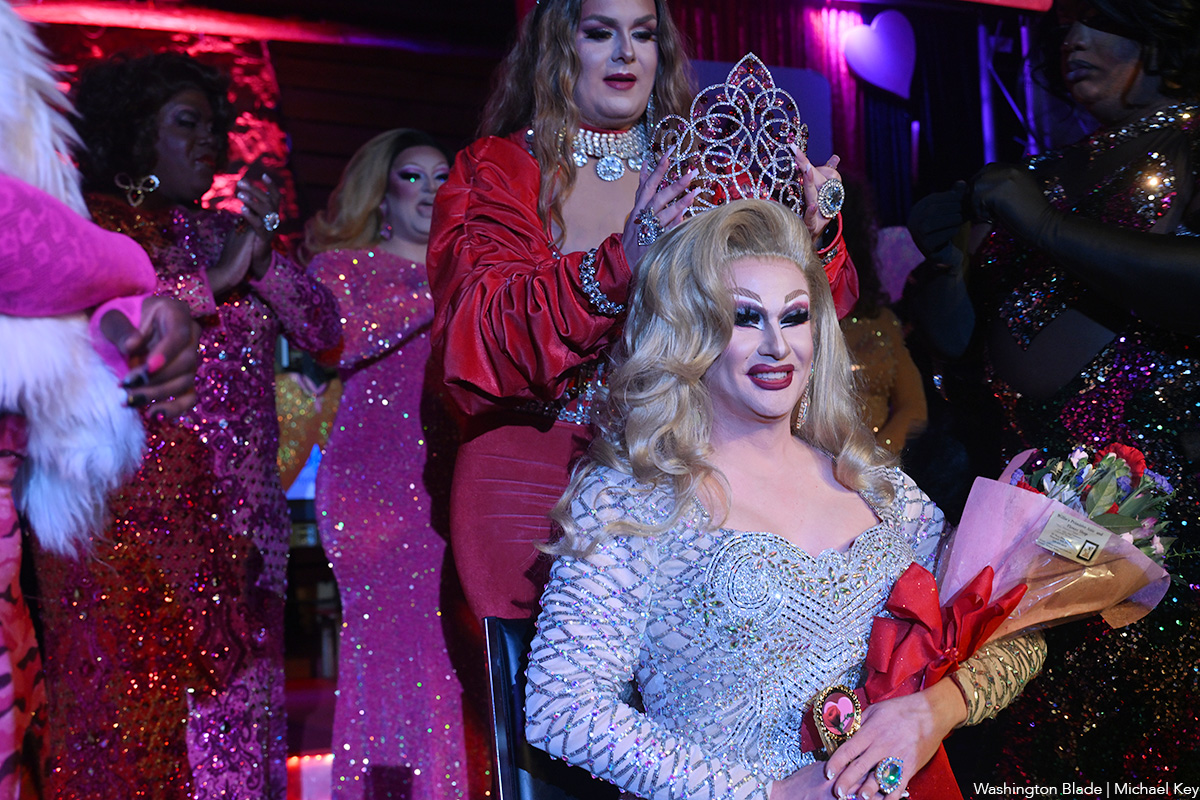
The 44th annual Queen of Hearts pageant was held at The Lodge in Boonsboro, Md. on Friday, Feb. 20. Six contestants vied for the title and Bev was crowned the winner.
(Washington Blade photos by Michael Key)
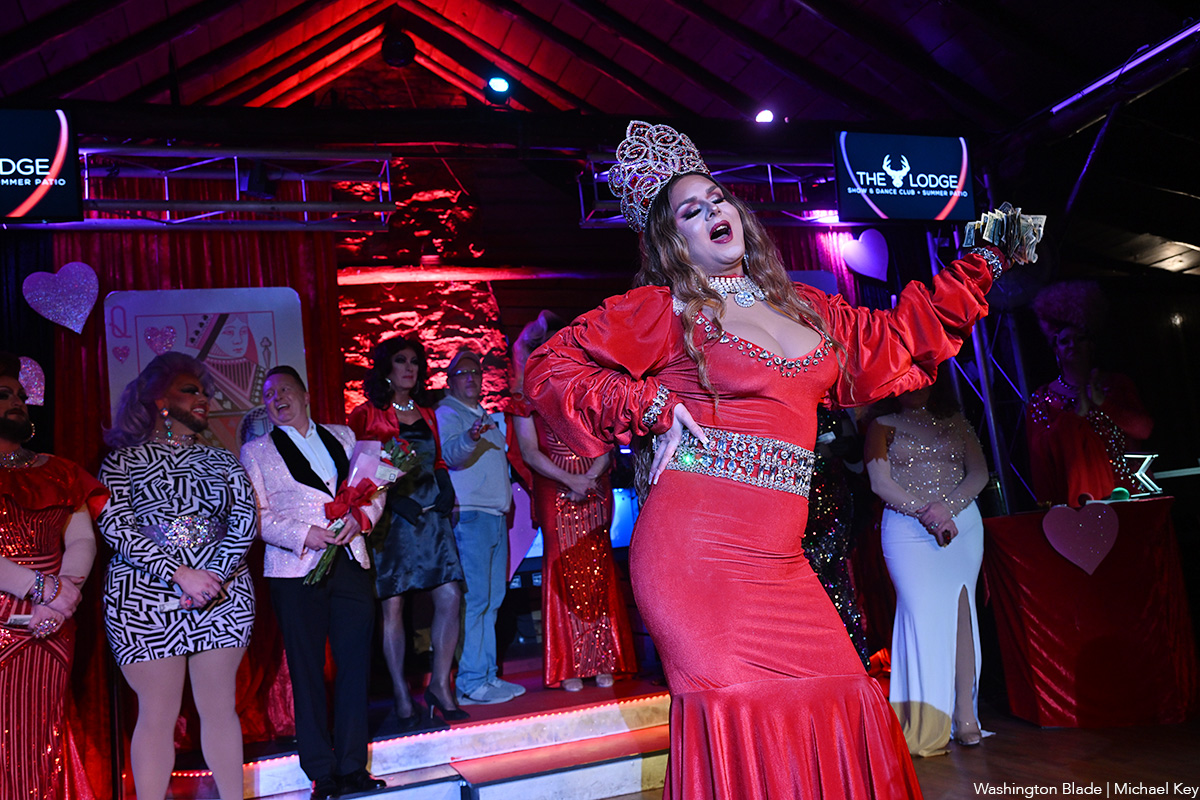
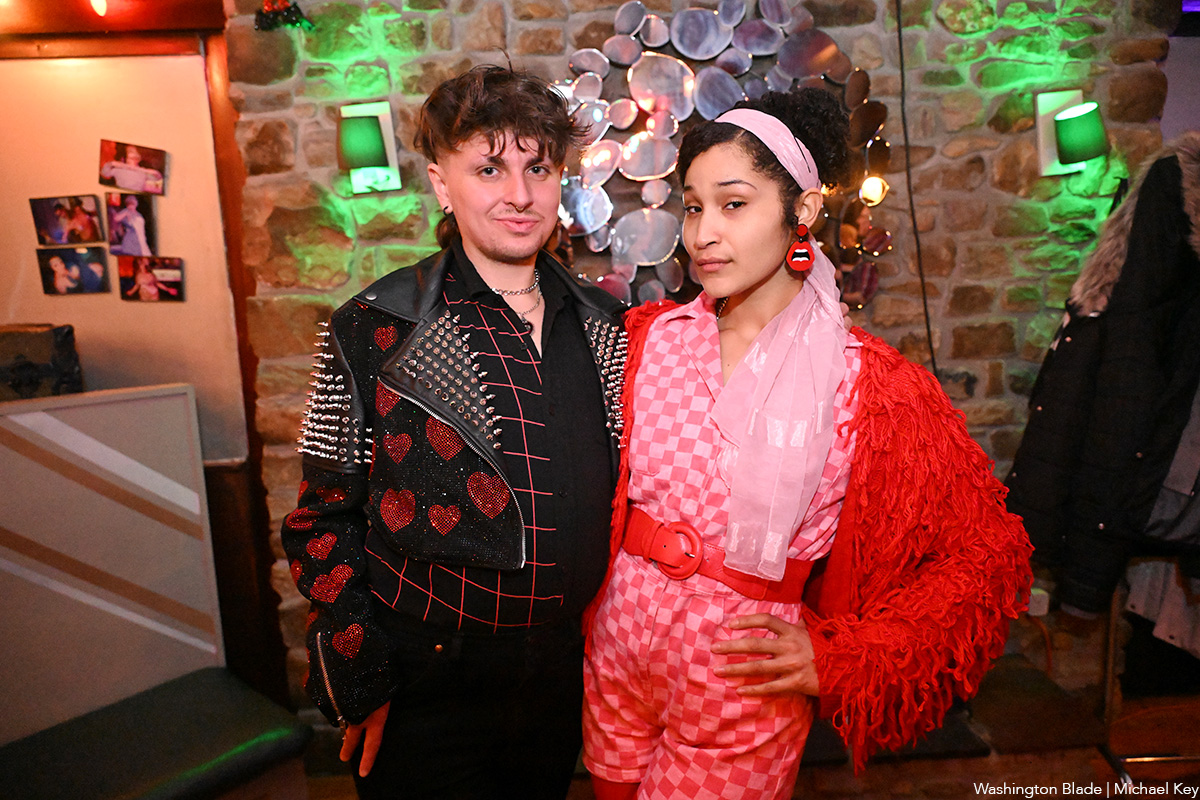
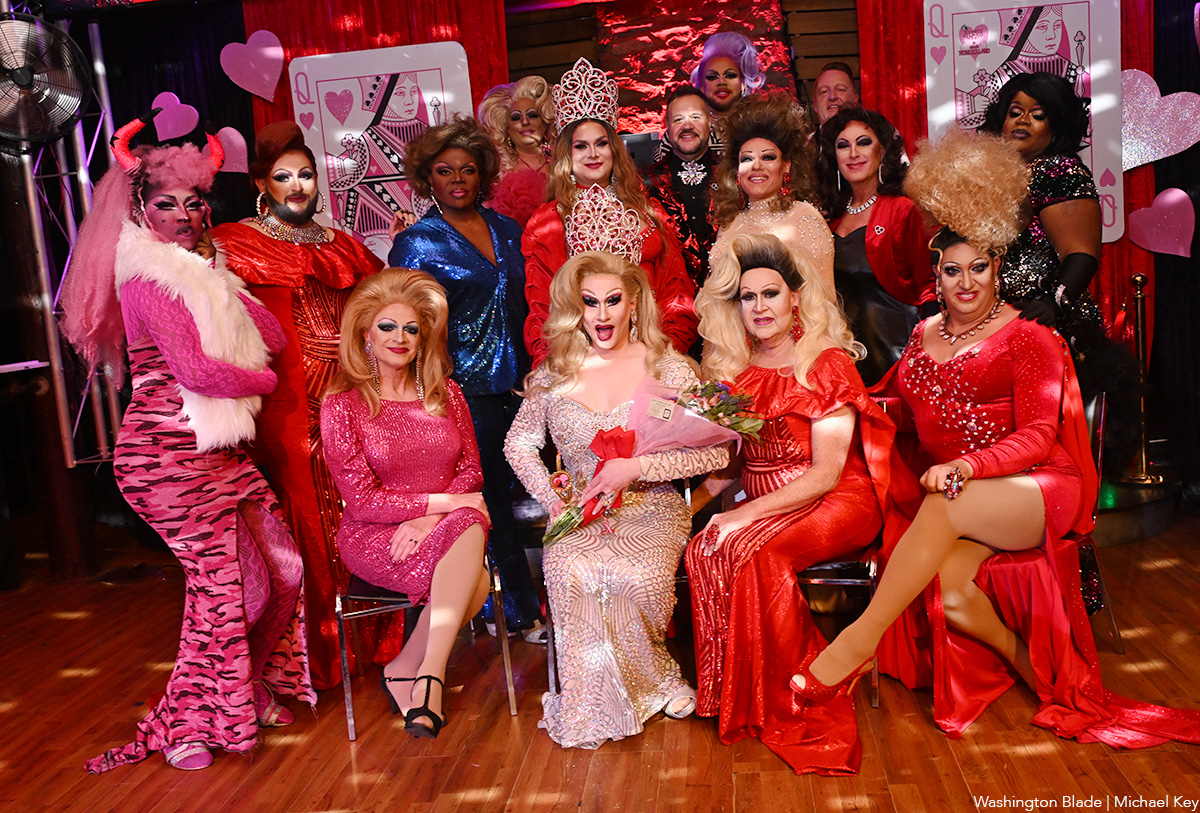
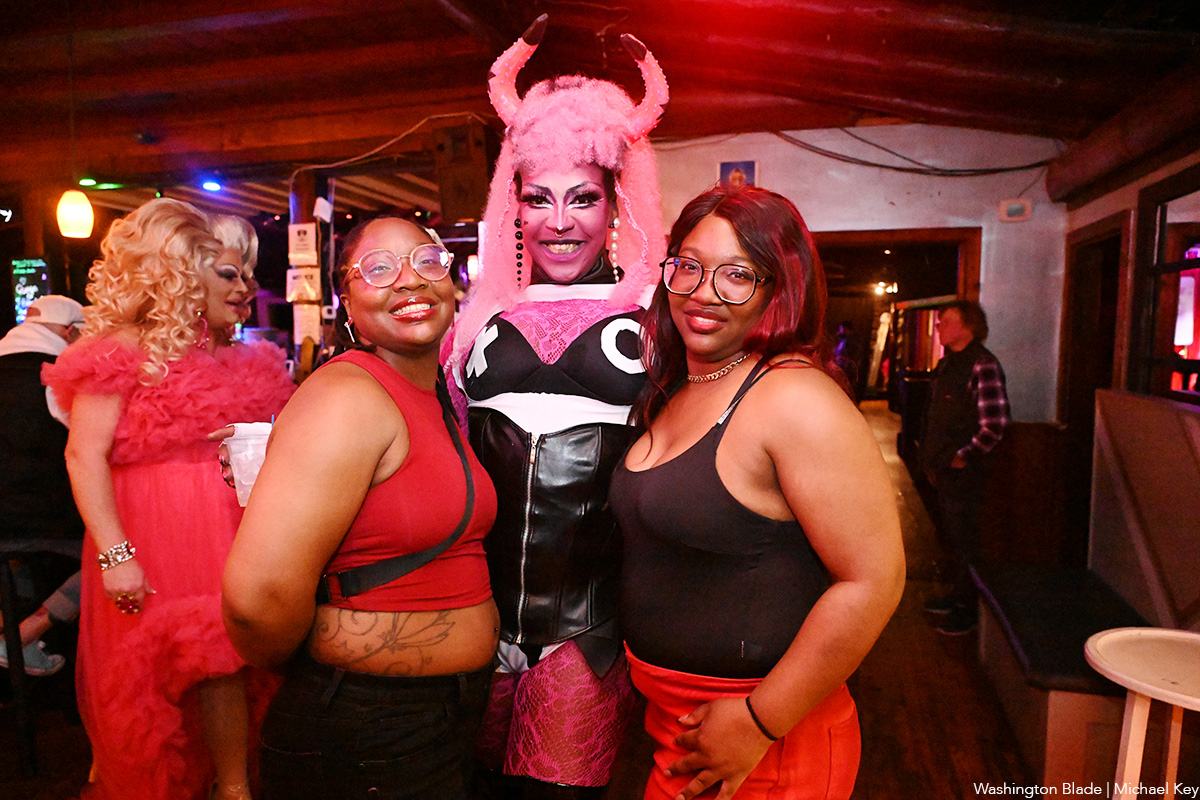
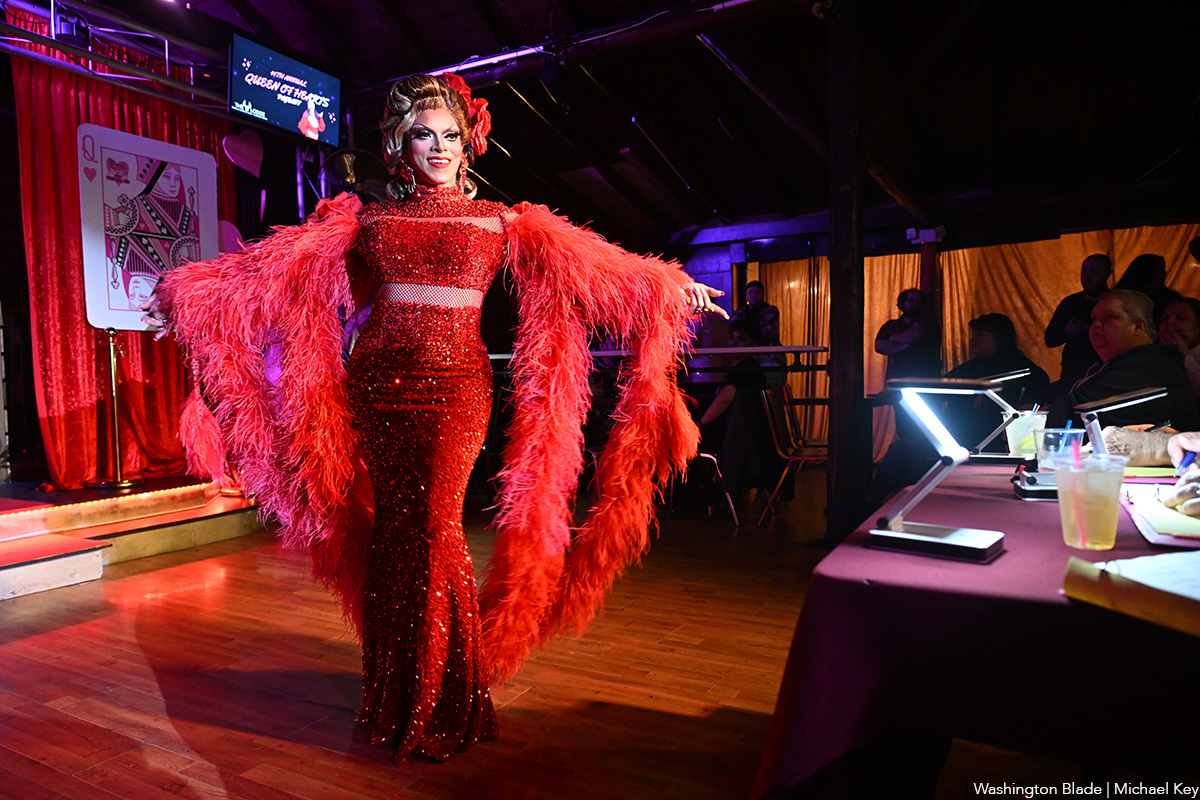
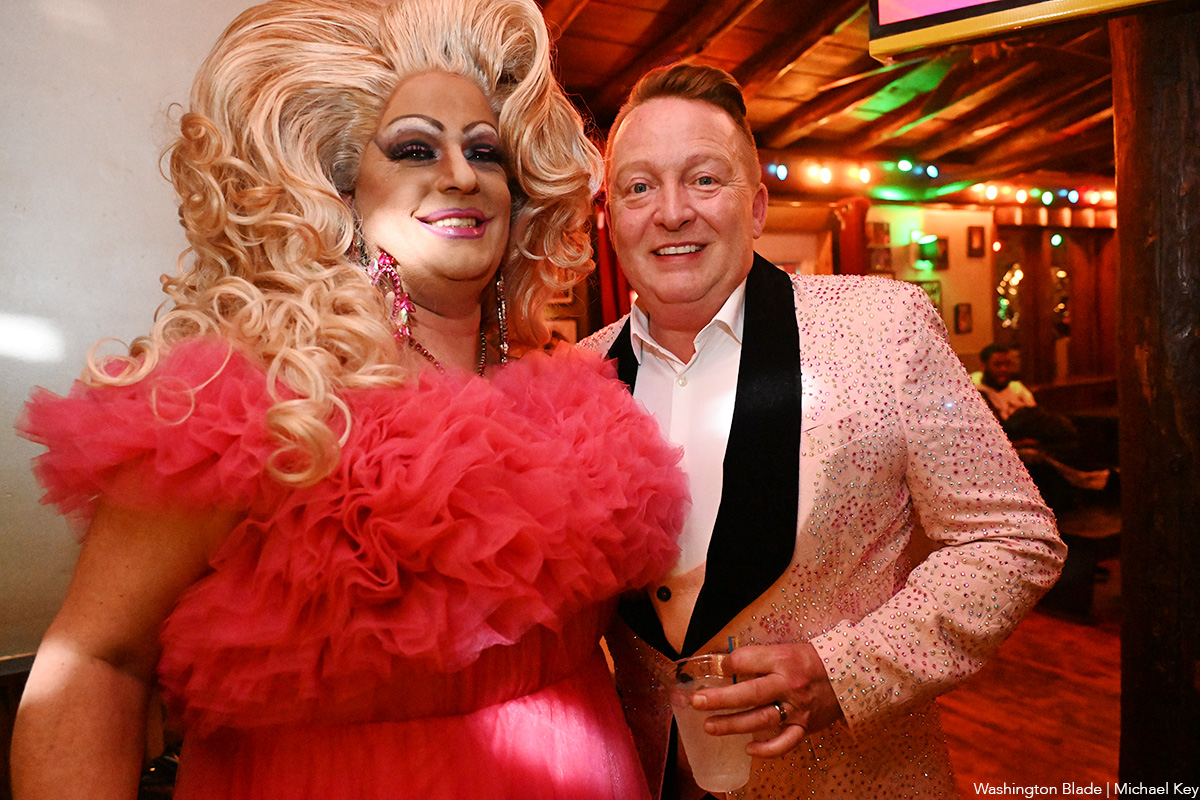
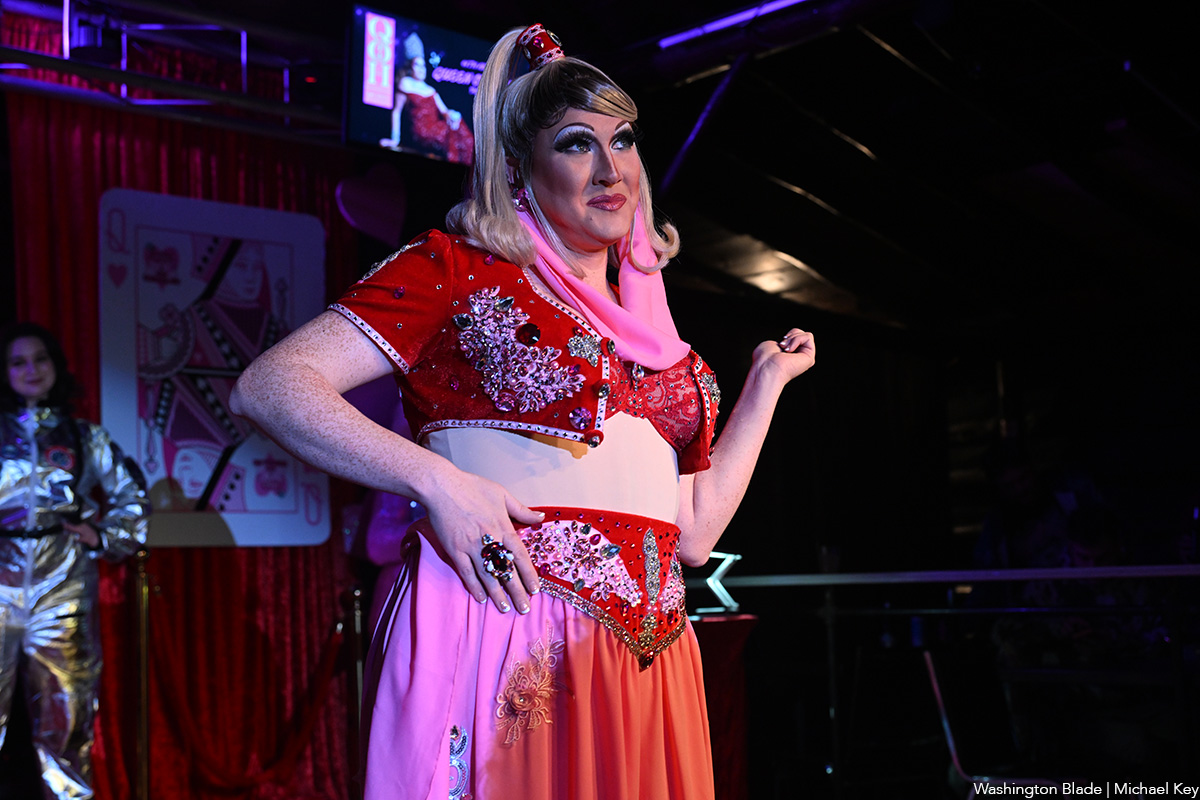
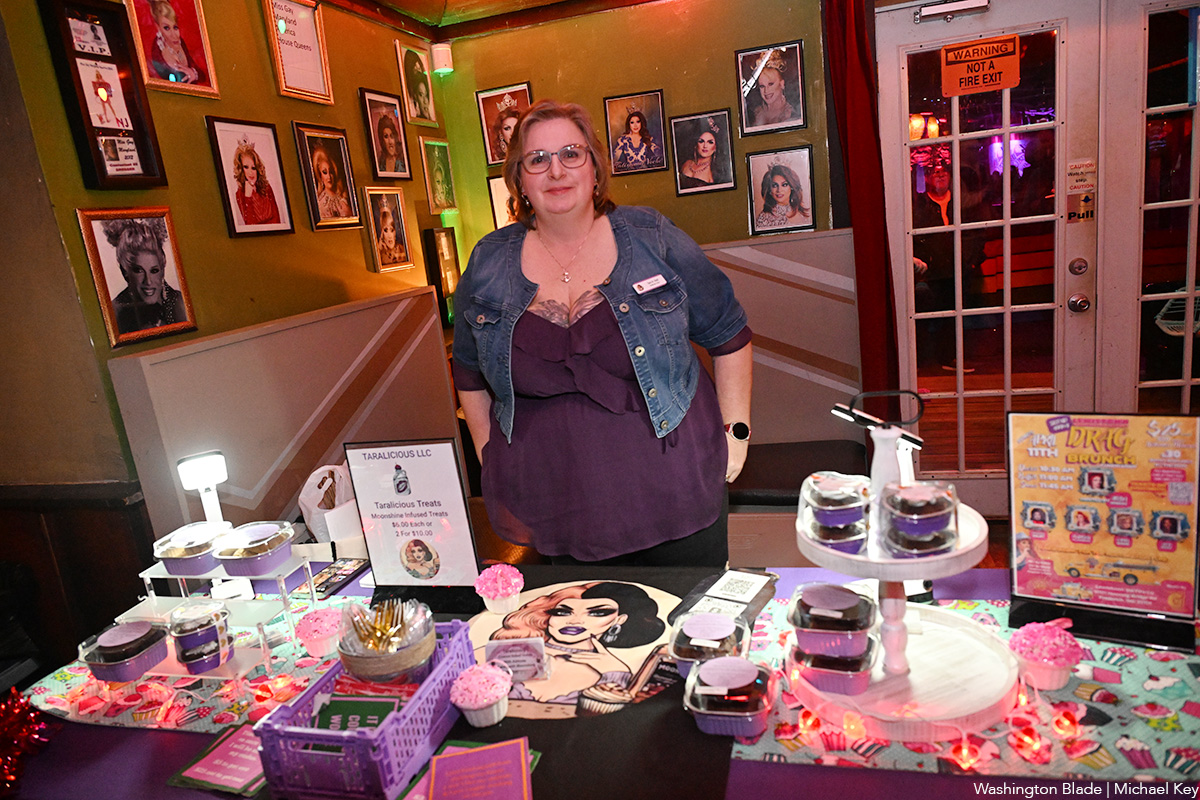
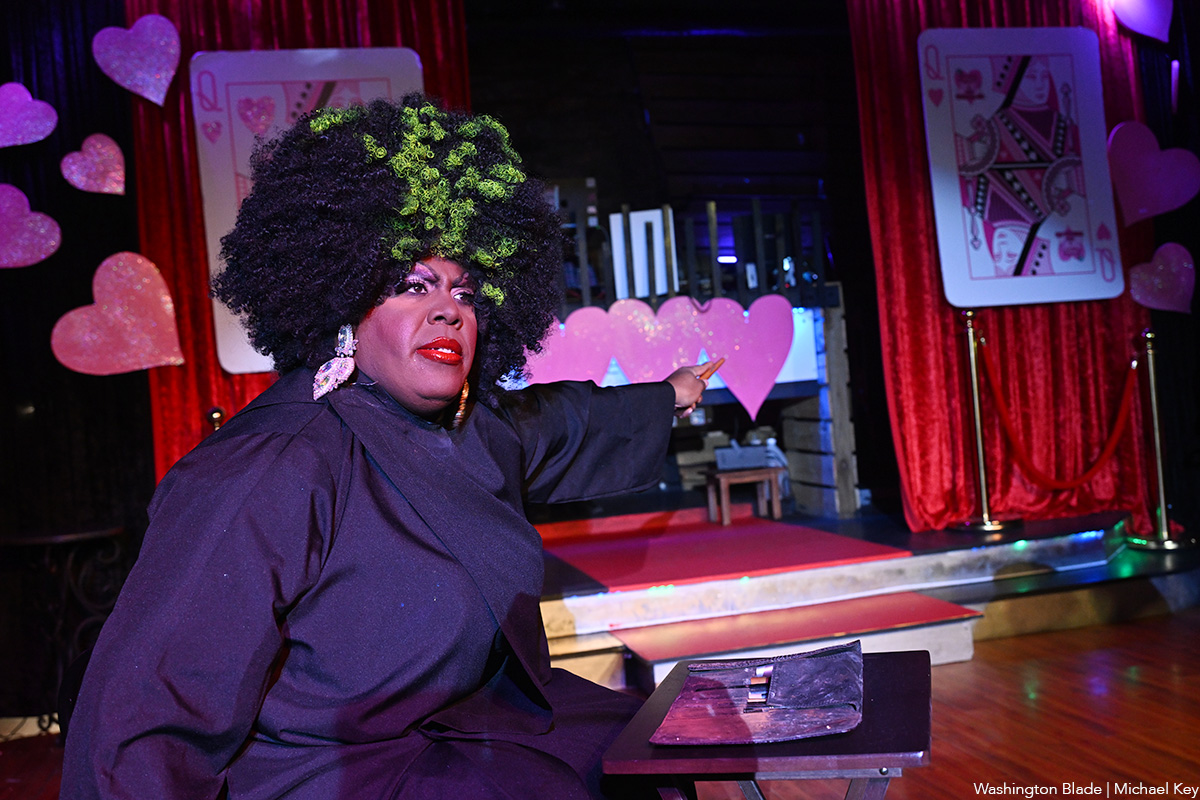
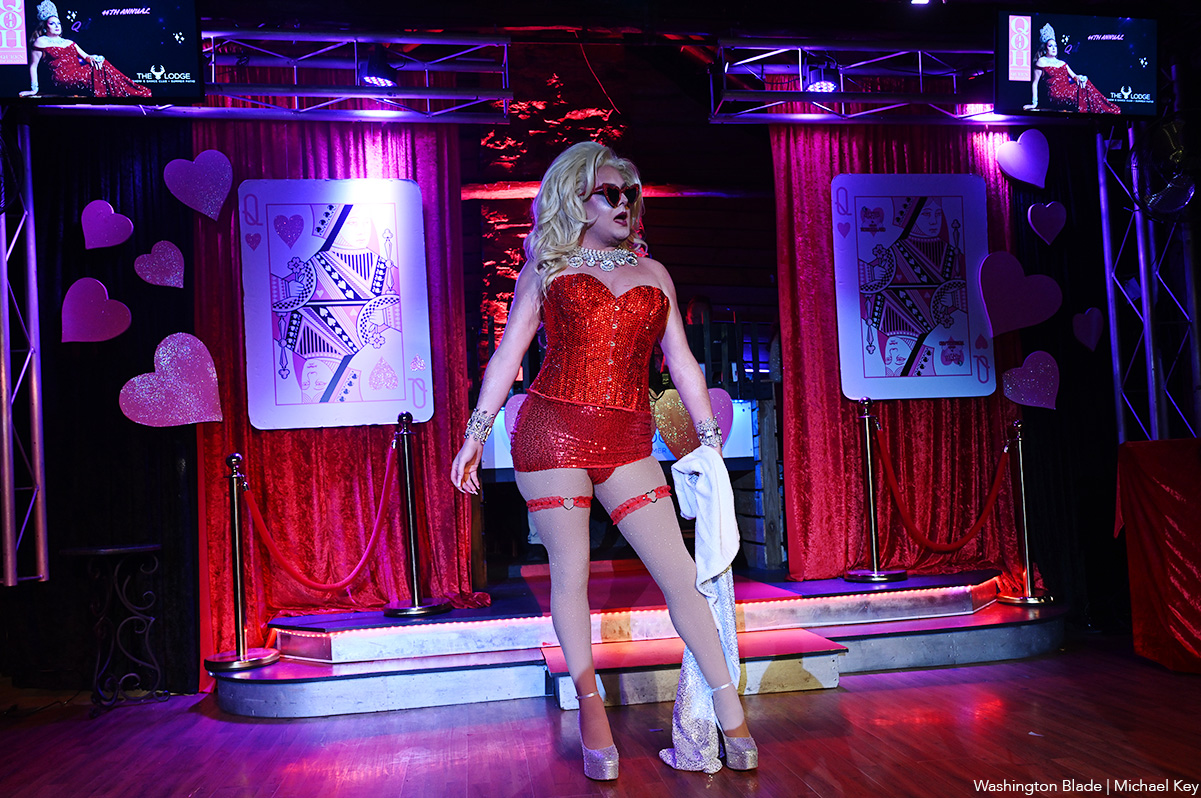
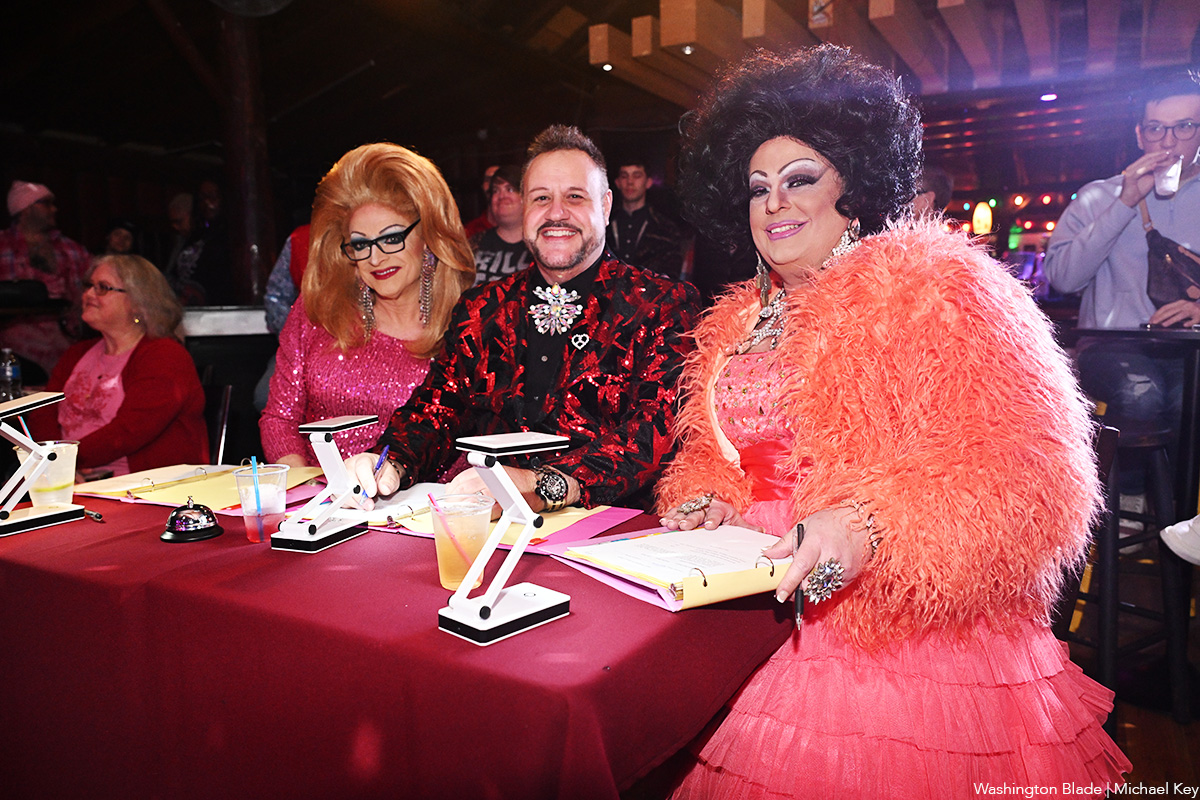
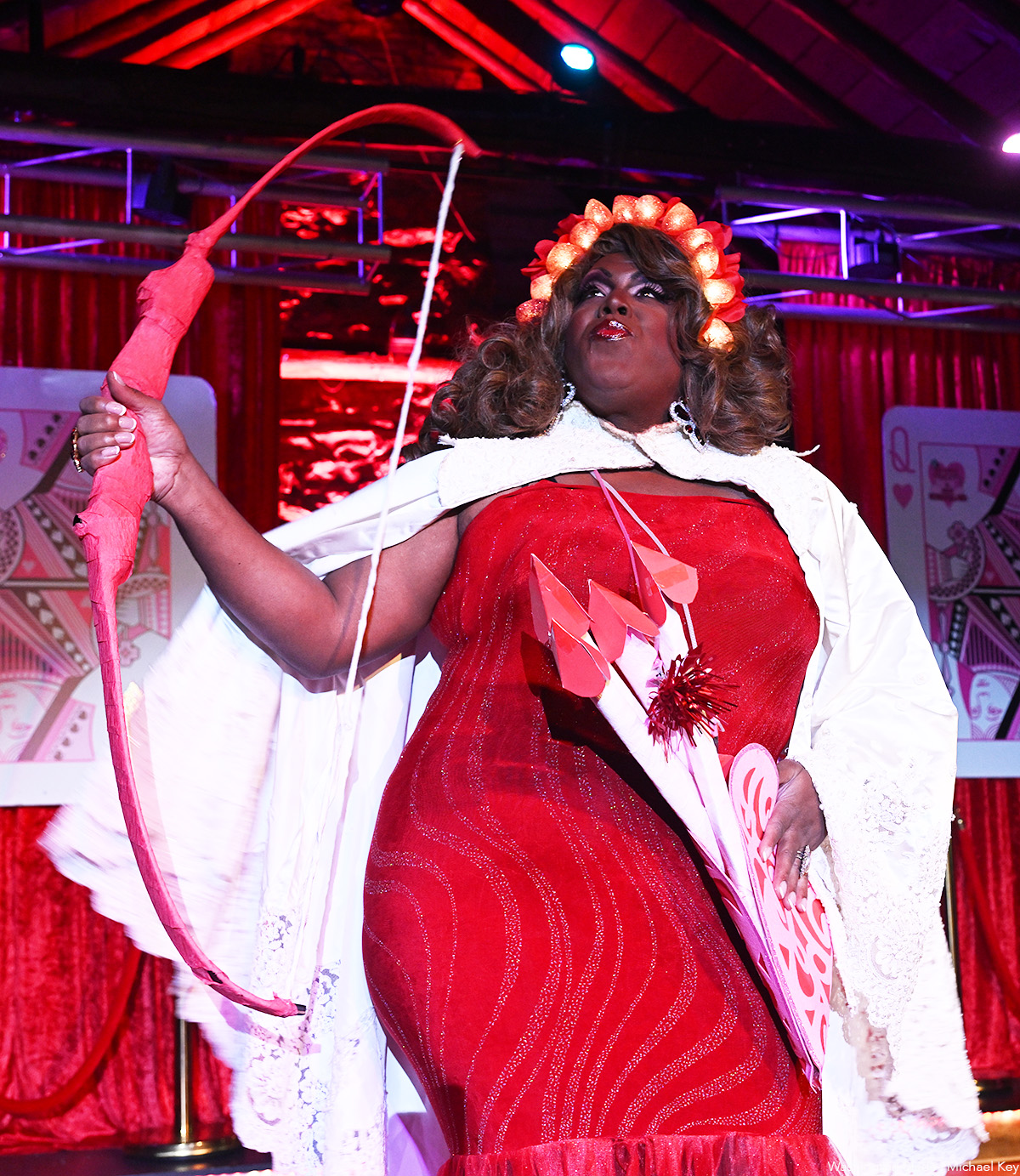
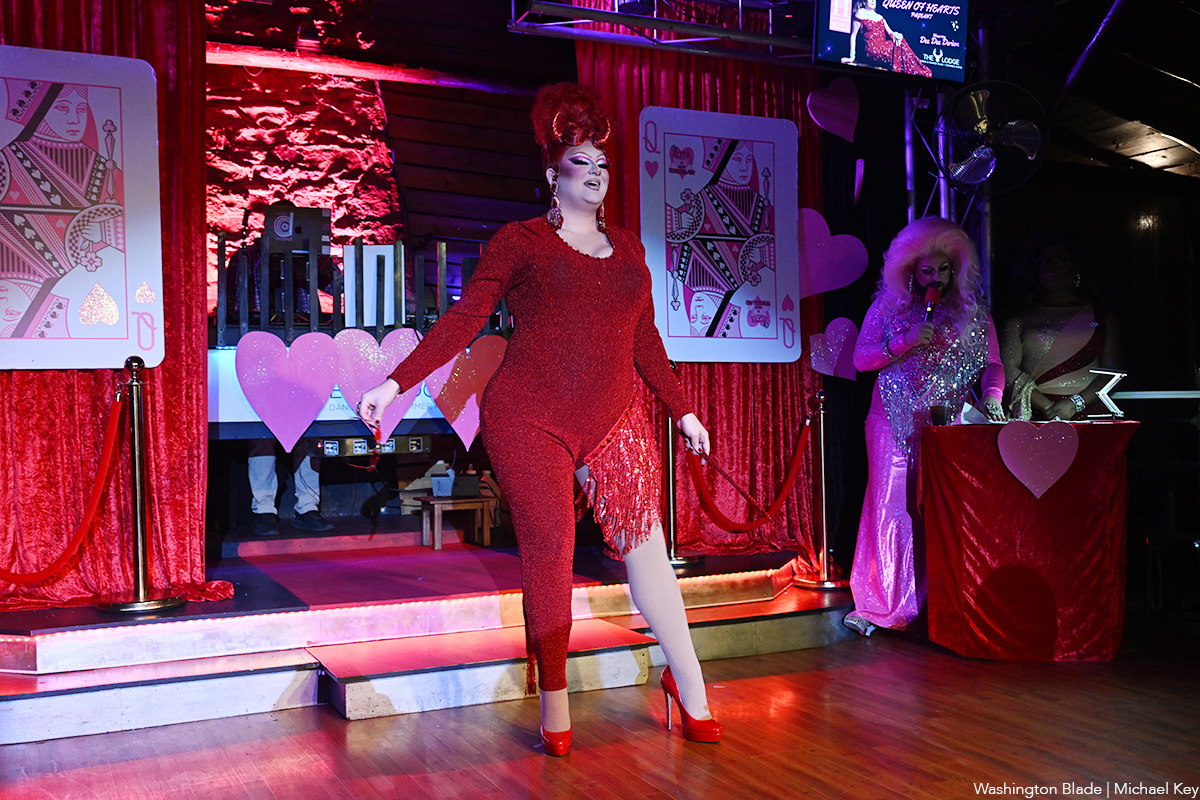
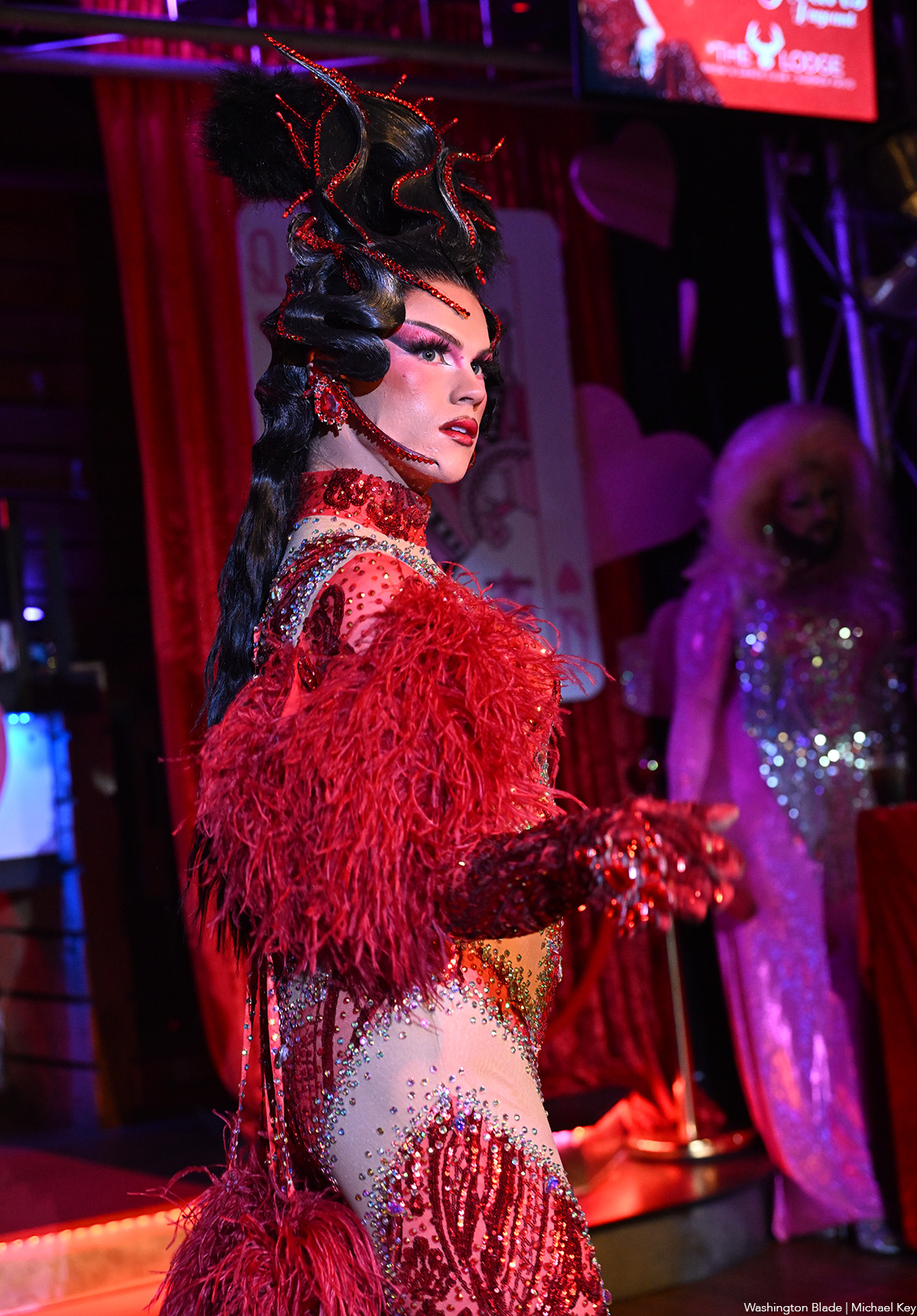
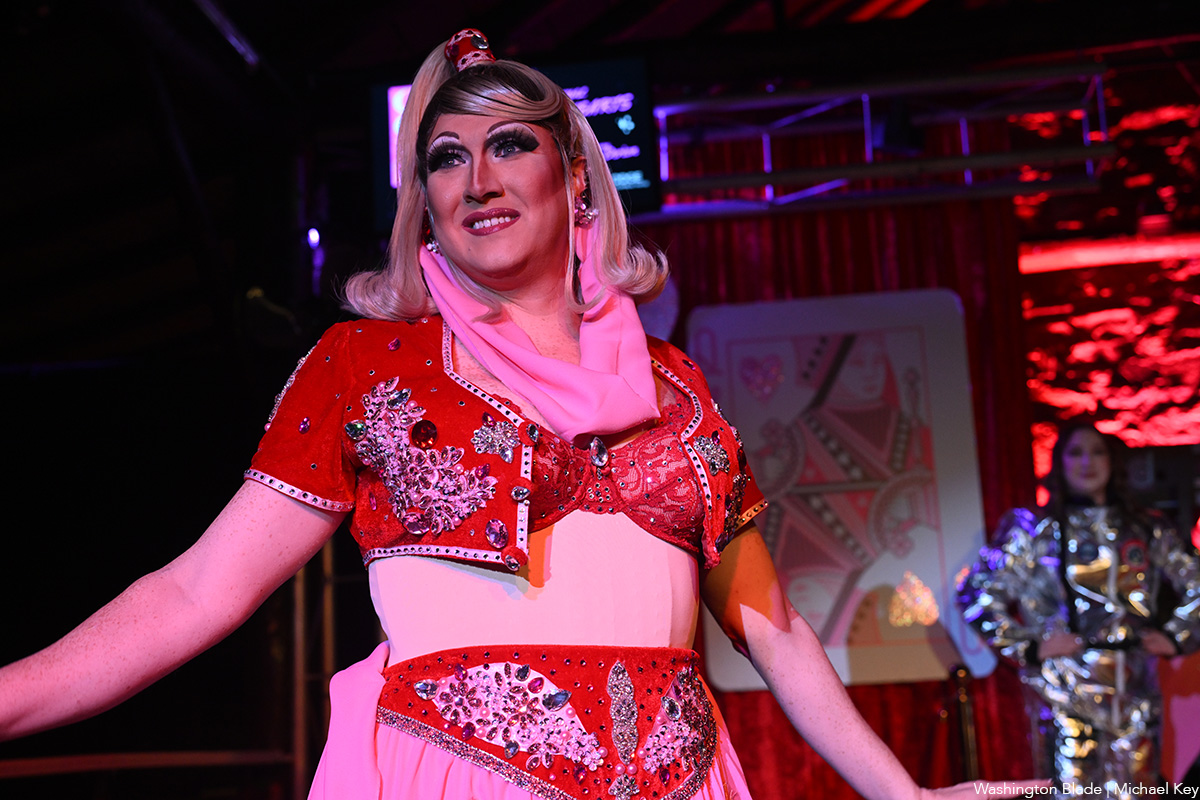
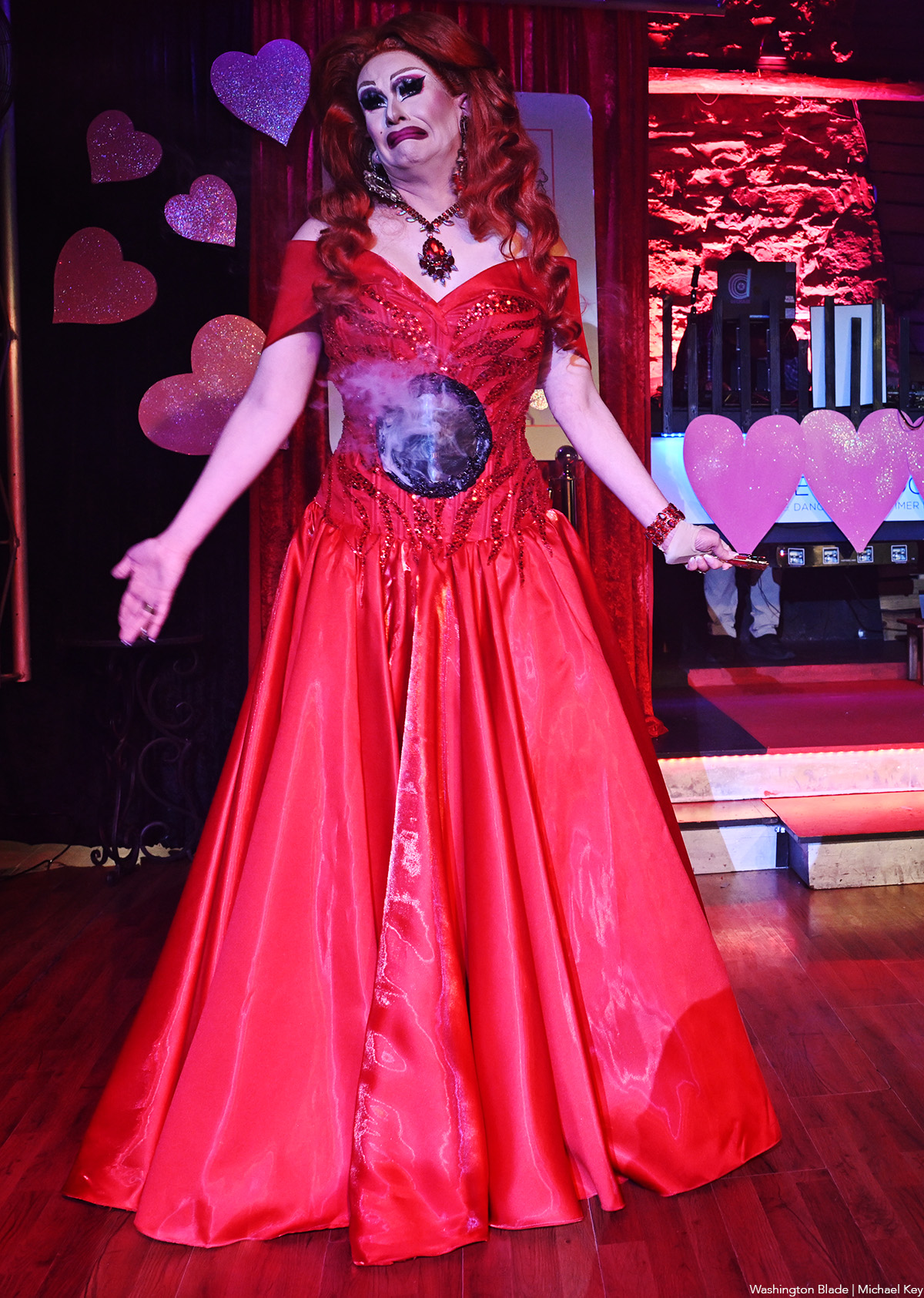
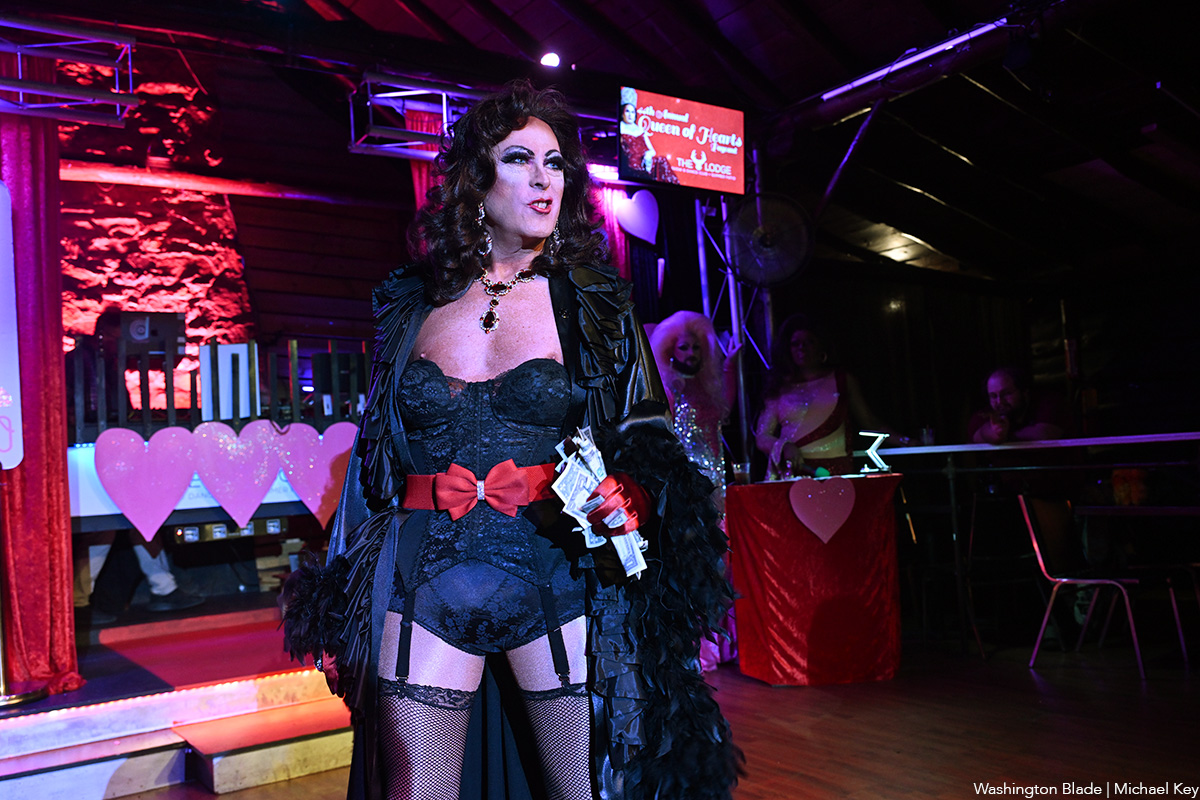
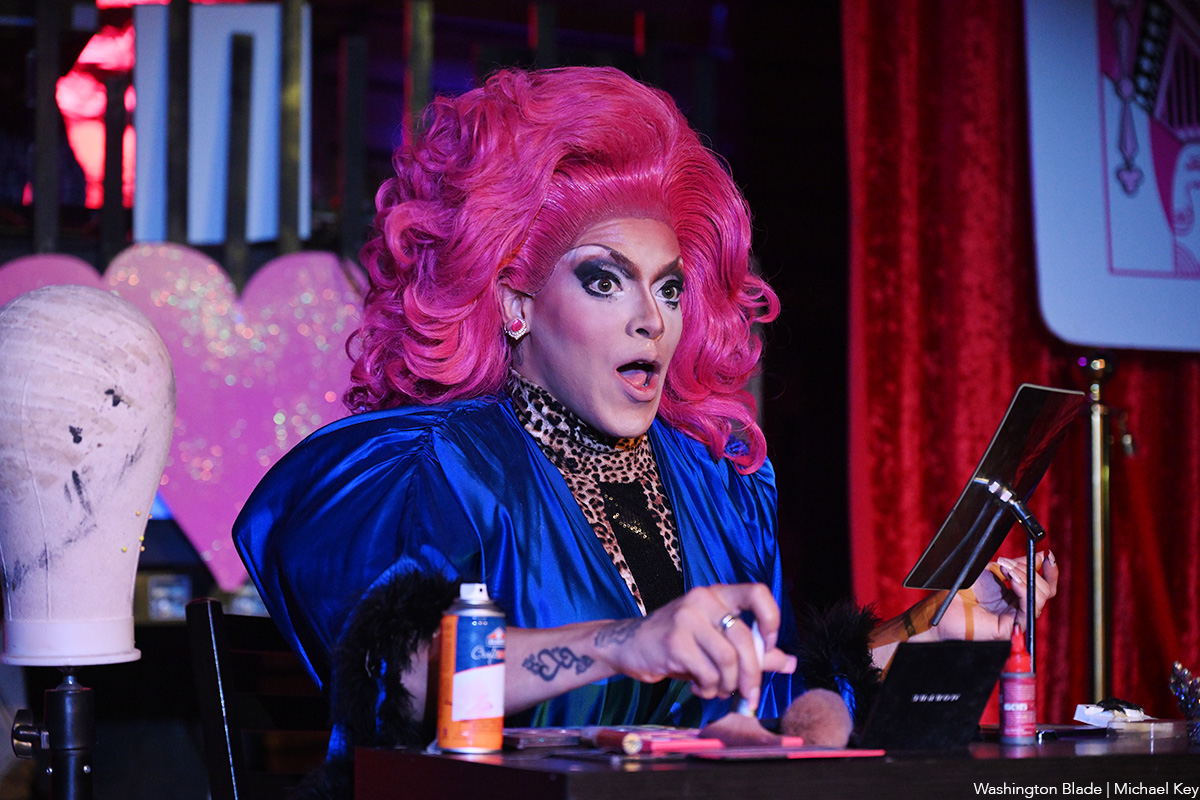
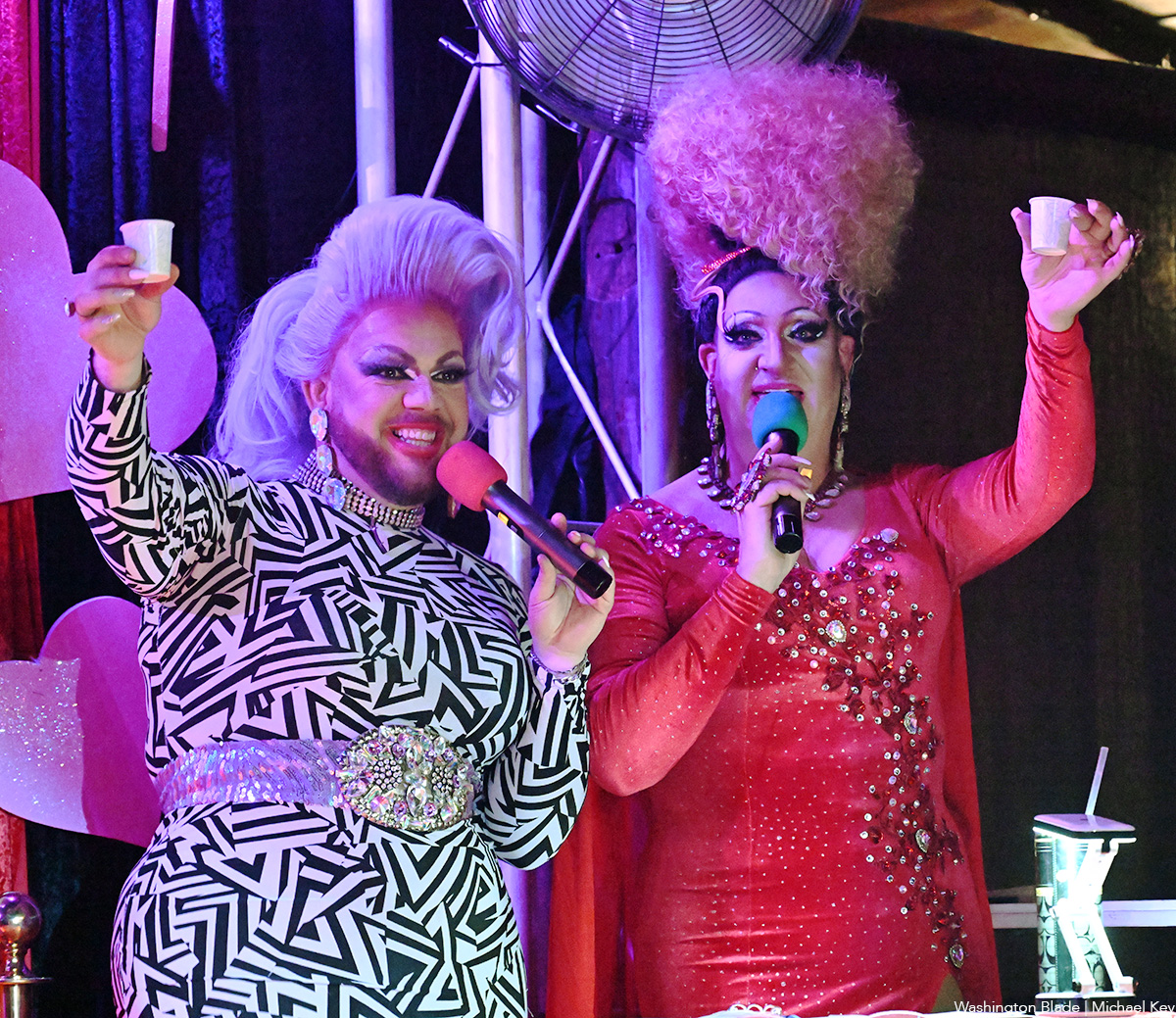
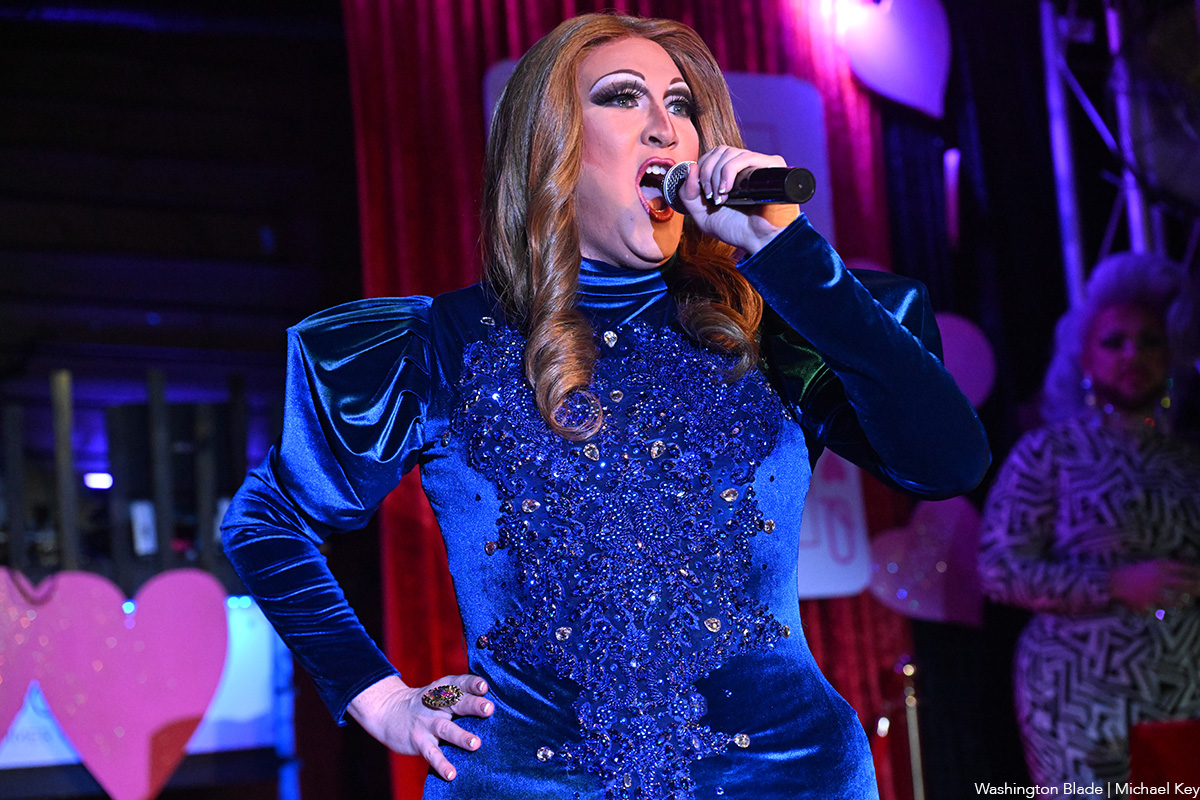
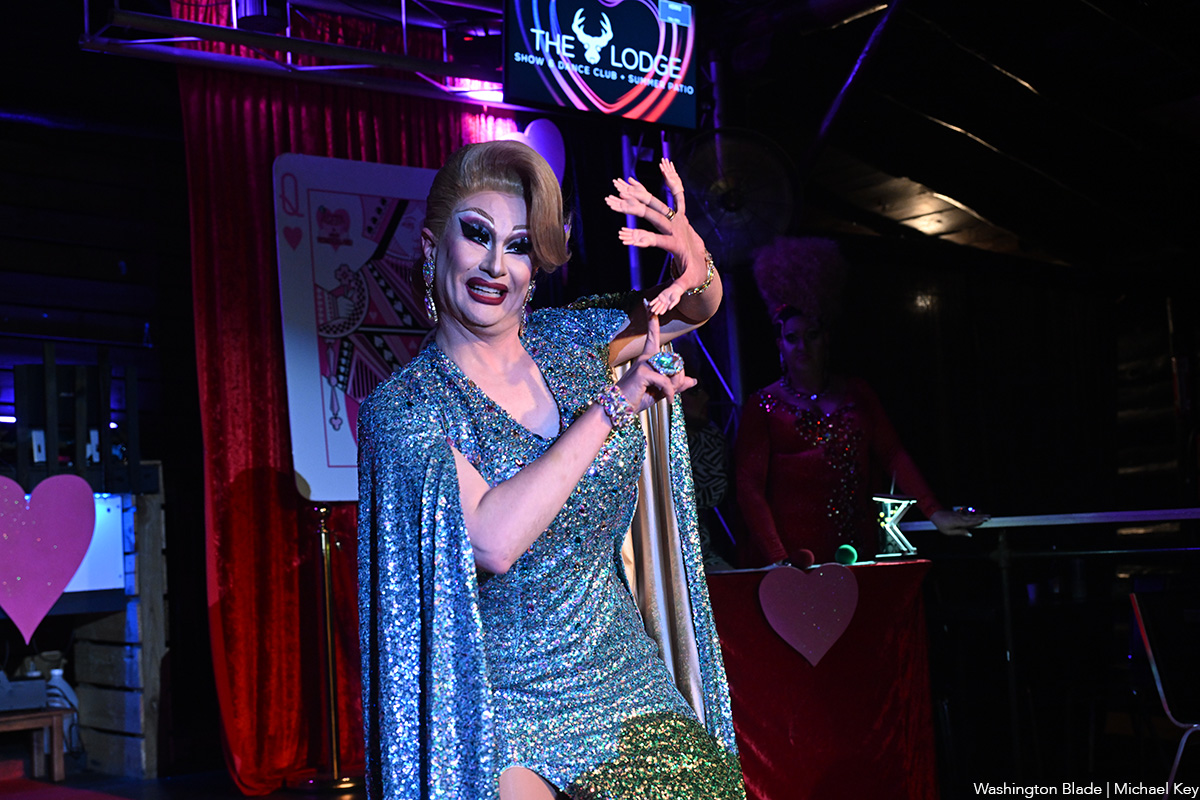
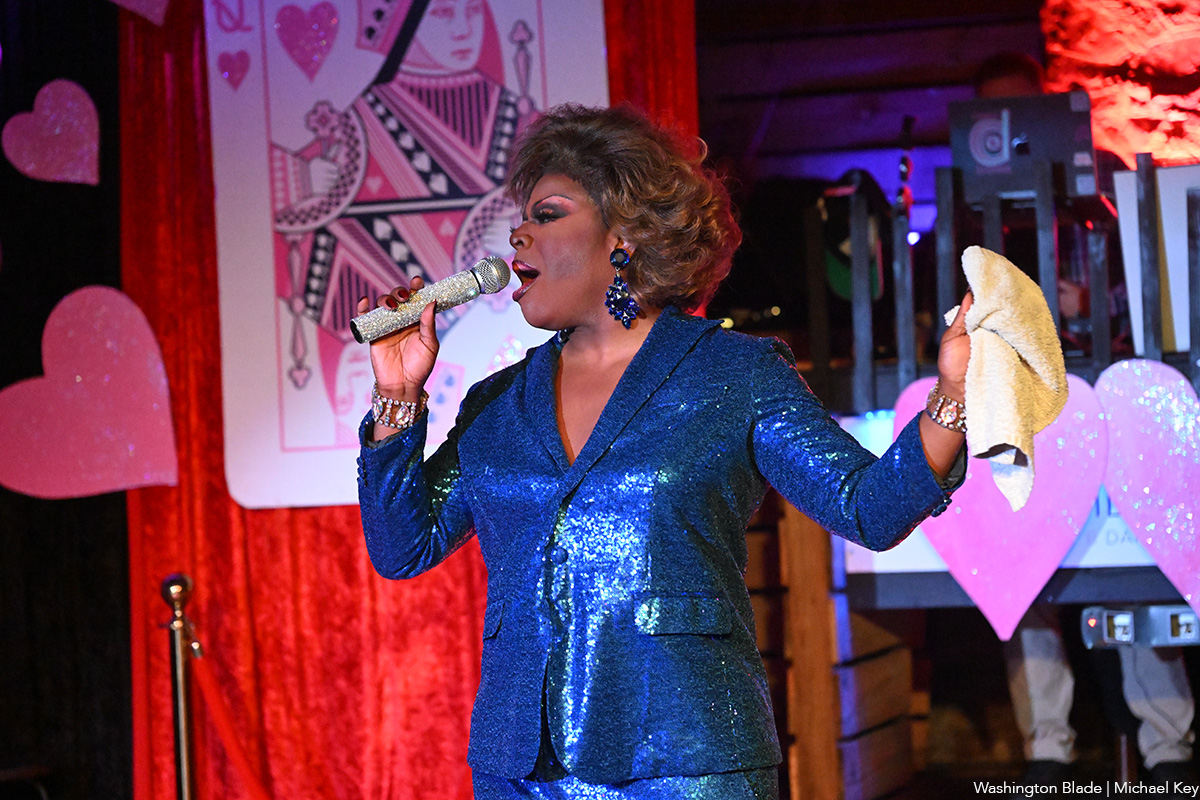
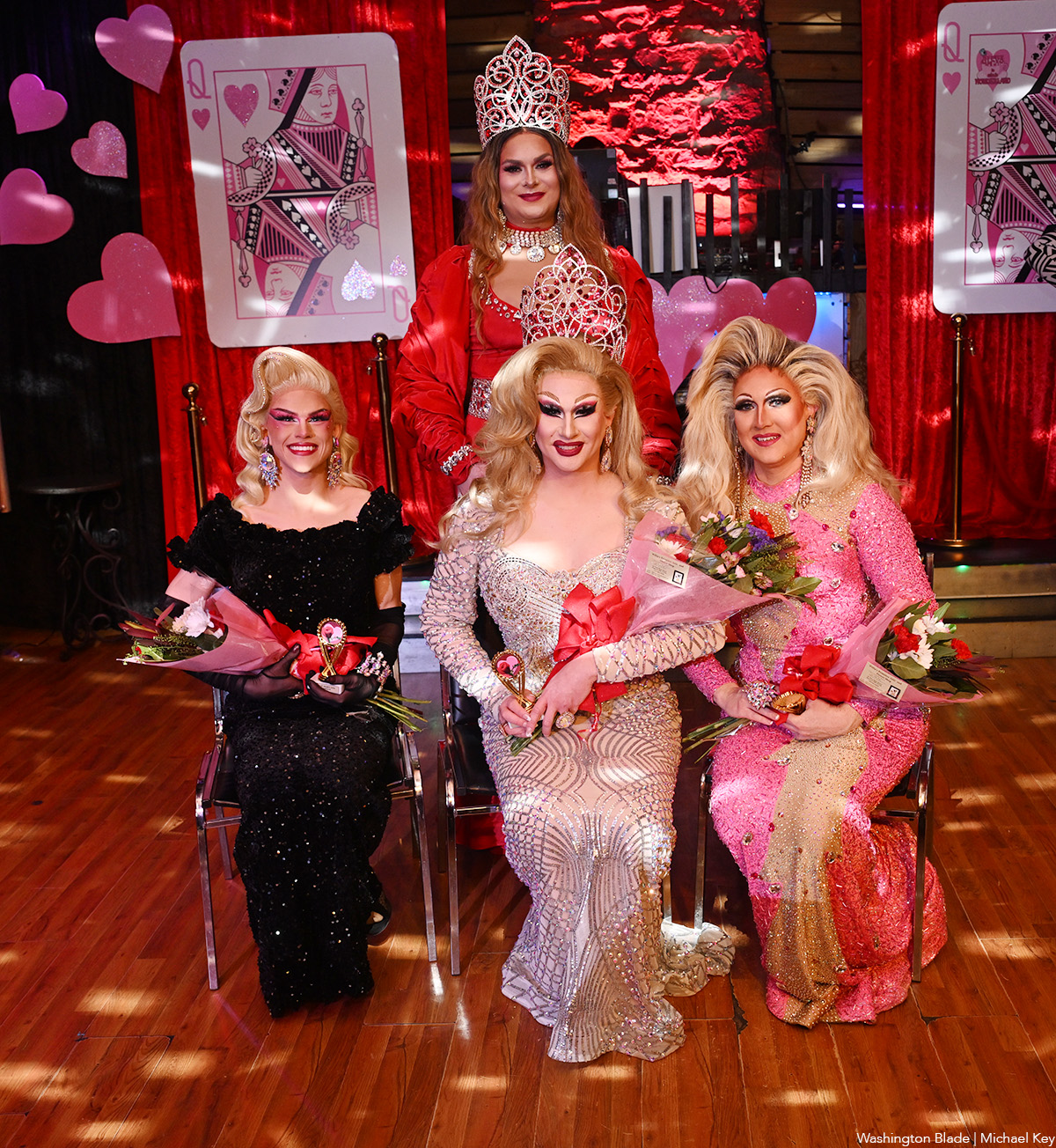
View on Threads
Books
New book profiles LGBTQ Ukrainians, documents war experiences
Tuesday marks four years since Russia attacked Ukraine

Journalist J. Lester Feder’s new book profiles LGBTQ Ukrainians and their experiences during Russia’s war against their country.
Feder for “The Queer Face of War: Portraits and Stories from Ukraine” interviewed and photographed LGBTQ Ukrainians in Kyiv, the country’s capital, and in other cities. They include Olena Hloba, the co-founder of Tergo, a support group for parents and friends of LGBTQ Ukrainians, who fled her home in the Kyiv suburb of Bucha shortly after Russia launched its war on Feb. 24, 2022.
Russian soldiers killed civilians as they withdrew from Bucha. Videos and photographs that emerged from the Kyiv suburb showed dead bodies with their hands tied behind their back and other signs of torture.

Olena Shevchenko, chair of Insight, a Ukrainian LGBTQ rights group, wrote the book’s forward.

The book also profiles Viktor Pylypenko, a gay man who the Ukrainian military assigned to the 72nd Mechanized Black Cossack Brigade after the war began. Feder writes Pylypenko’s unit “was deployed to some of the fiercest and most important battles of the war.”
“The brigade was pivotal to beating Russian forces back from Kyiv in their initial attempt to take the capital, helping them liberate territory near Kharkiv and defending the front lines in Donbas,” wrote Feder.
Pylypenko spent two years fighting “on Ukraine’s most dangerous battlefields, serving primarily as a medic.”
“At times he felt he was living in a horror movie, watching tank shells tear his fellow soldiers apart before his eyes,” wrote Feder. “He held many men as they took their final breaths. Of the roughly one hundred who entered the unit with him, only six remained when he was discharged in 2024. He didn’t leave by choice: he went home to take care of his father, who had suffered a stroke.”
Feder notes one of Pylypenko’s former commanders attacked him online when he came out. Pylypenko said another commander defended him.
Feder also profiled Diana and Oleksii Polukhin, two residents of Kherson, a port city in southern Ukraine that is near the mouth of the Dnieper River.
Ukrainian forces regained control of Kherson in November 2022, nine months after Russia occupied it.
Diana, a cigarette vender, and Polukhin told Feder that Russian forces demanded they disclose the names of other LGBTQ Ukrainians in Kherson. Russian forces also tortured Diana and Polukhin while in their custody.
Polukhim is the first LGBTQ victim of Russian persecution to report their case to Ukrainian prosecutors.

Feder, who is of Ukrainian descent, first visited Ukraine in 2013 when he wrote for BuzzFeed.
He was Outright International’s Senior Fellow for Emergency Research from 2021-2023. Feder last traveled to Ukraine in December 2024.
Feder spoke about his book at Politics and Prose at the Wharf in Southwest D.C. on Feb. 6. The Washington Blade spoke with Feder on Feb. 20.
Feder told the Blade he began to work on the book when he was at Outright International and working with humanitarian groups on how to better serve LGBTQ Ukrainians. Feder said military service requirements, a lack of access to hormone therapy and documents that accurately reflect a person’s gender identity and LGBTQ-friendly shelters are among the myriad challenges that LGBTQ Ukrainians have faced since the war began.
“All of these were components of a queer experience of war that was not well documented, and we had never seen in one place, especially with photos,” he told the Blade. “I felt really called to do that, not only because of what was happening in Ukraine, but also as a way to bring to the surface issues that we’d had seen in Iraq and Syria and Afghanistan.”

Feder also spoke with the Blade about the war’s geopolitical implications.
Russian President Vladimir Putin in 2013 signed a law that bans the “promotion of homosexuality” to minors.
The 2014 Winter Olympics took place in Sochi, a Russian resort city on the Black Sea. Russia annexed Crimea from Ukraine a few weeks after the games ended.
Russia’s anti-LGBTQ crackdown has continued over the last decade.
The Russian Supreme Court in 2023 ruled the “international LGBT movement” is an extremist organization and banned it. The Russian Justice Ministry last month designated ILGA World, a global LGBTQ and intersex rights group, as an “undesirable” organization.
Ukraine, meanwhile, has sought to align itself with Europe.
Ukrainian President Volodymyr Zelenskyy after a 2021 meeting with then-President Joe Biden at the White House said his country would continue to fight discrimination based on sexual orientation and gender identity. (Zelenskyy’s relationship with the U.S. has grown more tense since the Trump-Vance administration took office.) Zelenskyy in 2022 publicly backed civil partnerships for same-sex couples.
Then-Ukrainian Ambassador to the U.S. Oksana Markarova in 2023 applauded Kyiv Pride and other LGBTQ and intersex rights groups in her country when she spoke at a photo exhibit at Ukraine House in D.C. that highlighted LGBTQ and intersex soldiers. Then-Kyiv Pride Executive Director Lenny Emson, who Feder profiles in his book, was among those who attended the event.
“Thank you for everything you do in Kyiv, and thank you for everything that you do in order to fight the discrimination that still is somewhere in Ukraine,” said Markarova. “Not everything is perfect yet, but you know, I think we are moving in the right direction. And we together will not only fight the external enemy, but also will see equality.”
Feder in response to the Blade’s question about why he decided to write his book said he “didn’t feel” the “significance of Russia’s war against Ukraine” for LGBTQ people around the world “was fully understood.”
“This was an opportunity to tell that big story,” he said.
“The crackdown on LGBT rights inside Russia was essentially a laboratory for a strategy of attacking democratic values by attacking queer rights and it was one as Ukraine was getting closet to Europe back in 2013, 2014,” he added. “It was a strategy they were using as part of their foreign policy, and it was one they were using not only in Ukraine over the past decade, but around the world.”
Feder said Republicans are using “that same strategy to attack queer people, to attack democracy itself.”
“I felt like it was important that Americans understand that history,” he said.

More than a dozen LGBTQ athletes won medals at the Milan Cortina Winter Olympics that ended on Sunday.
Cayla Barnes, Hilary Knight, and Alex Carpenter are LGBTQ members of the U.S. women’s hockey team that won a gold medal after they defeated Canada in overtime. Knight the day before the Feb. 19 match proposed to her girlfriend, Brittany Bowe, an Olympic speed skater.
French ice dancer Guillaume Cizeron, who is gay, and his partner Laurence Fournier Beaudry won gold. American alpine skier Breezy Johnson, who is bisexual, won gold in the women’s downhill. Amber Glenn, who identifies as bisexual and pansexual, was part of the American figure skating team that won gold in the team event.
Swiss freestyle skier Mathilde Gremaud, who is in a relationship with Vali Höll, an Austrian mountain biker, won gold in women’s freeski slopestyle.
Bruce Mouat, who is the captain of the British curling team that won a silver medal, is gay. Six members of the Canadian women’s hockey team — Emily Clark, Erin Ambrose, Emerance Maschmeyer, Brianne Jenner, Laura Stacey, and Marie-Philip Poulin — that won silver are LGBTQ.
Swedish freestyle skier Sandra Naeslund, who is a lesbian, won a bronze medal in ski cross.
Belgian speed skater Tineke den Dulk, who is bisexual, was part of her country’s mixed 2000-meter relay that won bronze. Canadian ice dancer Paul Poirier, who is gay, and his partner, Piper Gilles, won bronze.
Laura Zimmermann, who is queer, is a member of the Swiss women’s hockey team that won bronze when they defeated Sweden.
Outsports.com notes all of the LGBTQ Olympians who competed at the games and who medaled.
-

 District of Columbia4 days ago
District of Columbia4 days agoJudge rescinds order against activist in Capital Pride lawsuit
-

 District of Columbia4 days ago
District of Columbia4 days agoTrans activists arrested outside HHS headquarters in D.C.
-

 Opinions4 days ago
Opinions4 days agoHow do we honor Renee Good, Alex Pretti?
-

 Sports5 days ago
Sports5 days agoUS wins Olympic gold medal in women’s hockey



